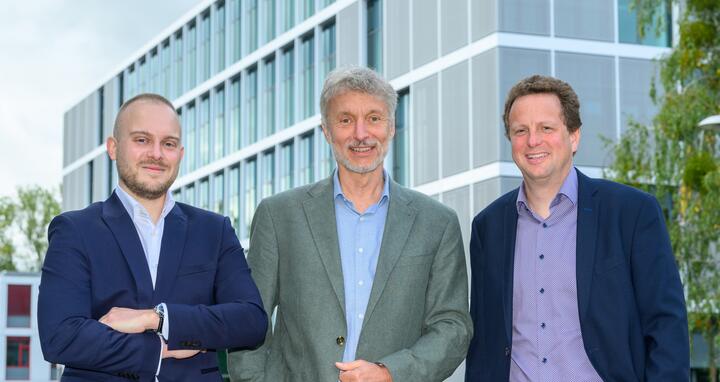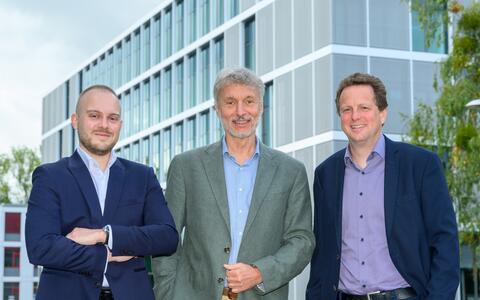New agent regulates serotonin production
Joint press release of the Max Delbrück Center and the Leibniz-Forschungsinstitut für Molekulare Pharmakologie (FMP).
Serotonin makes you feel good. This neurotransmitter known as the “happiness hormone” regulates mood, sleep, and appetite. It also plays a key role in the gastrointestinal tract, where it is involved in regulating intestinal movement and the release of fluids that are important for the digestion and absorption of nutrients.
We have now founded Trypto Therapeutics to bring our new therapeutic agent to the market.
But too much serotonin causes health problems. An oversupply of the hormone can disrupt normal bodily functions and trigger various diseases. Professor Michael Bader and Dr. Edgar Specker have developed a drug that specifically lowers serotonin levels. Bader leads the Molecular Biology of Peptide Hormones Lab at the Max Delbrück Center, while Specker heads the Compound Management Core Facility at the Leibniz-Forschungsinstitut für Molekulare Pharmakologie (FMP). “We have now founded Trypto Therapeutics to bring our new therapeutic agent to the market,” says Bader. Along with the two scientists, biotech entrepreneurs Dirk Pleimes and Dr. Radoslaw Wesolowski are also involved in the new company. Max Delbrück Center and the FMP have an equity stake in the spin-off.
Stopped by the blood-brain barrier
Scientists don’t know exactly why serotonin production gets out of whack. An exception is carcinoid syndrome, a tumor disease in which hormone-producing cells release inordinate amounts of serotonin. Carcinoid syndrome is often associated with diseases like pulmonary hypertension, intestinal diseases, and heart valve fibrosis. However, they can also occur in patients without carcinoid syndrome. As different as these diseases are, elevated serotonin is involved in the development of all of them.
This is where the molecule that Bader and Specker discovered and further developed in the FMP’s compound library comes into play. It is called TPT-004 and inhibits an enzyme found in gastrointestinal tract cells, called tryptophan hydroxylase (TPH), that plays a role in serotonin synthesis. Lower TPH activity means less serotonin circulating through the body. The researchers showed that the administration of TPT-004 improves the health of rats with pulmonary hypertension. They were also able to prove that this molecule cannot cross the blood-brain barrier in mice. This is important because serotonin is also produced in the neurons – a process that should not be blocked because the brain requires the neurotransmitter to function properly.
Venture capital needed to move forward
A great deal of funding has gone into developing the TPH inhibitor so far – through the Max Delbrück Center’s Pre-GoBio funding scheme, through various lines of funding from the German Federal Ministry of Education and Research (BMBF) and, most recently, through the Max Delbrück Center’s SPOT spin-off support program. “We’ve received around €4.5 million in total,” says Bader. “But public third-party funding is not enough to take the next step. We need venture capital to do this. That’s why we founded Trypto Therapeutics.”
Radoslaw Wesolowski (left), Michael Bader (center) and Dr. Edgar Specker have teamed up to develop a potential therapeutic agent that influences serotonin levels.
The scientists first plan to develop a method for producing their therapeutic agent in pure form in sufficient quantities so that it can be used in human clinical trials. They will also carry out a toxicity study in order to investigate the risks and possible side effects of the compound. Only then will it be possible to conduct a phase I clinical trial on a small group of healthy volunteers. “If we successfully complete the phase I trial, we will then decide whether to conduct a subsequent phase II study or sell the whole thing,” says Bader. The researchers initially want to test the drug on patients with pulmonary hypertension. If this works, they want to examine whether TPT-004 helps treat other diseases associated with elevated serotonin levels. Their development pipeline also includes new inhibitors for other enzymes.
Text: Jana Ehrhardt-Joswig
Further information
Downloads
Radoslaw Wesolowski (left), Michael Bader (center) and Dr. Edgar Specker have teamed up to develop a potential therapeutic agent that influences serotonin levels. Peter Himsel, Campus Berlin-Buch GmbH
Contact
Professor Michael Bader
Head of the lab “Molecular Biology of Peptide Hormones”
Max Delbrück Center
+49 (0)30 9406 2193
mbader@mdc-berlin.de
Christina Anders
Editor, Communications Department
Max Delbrück Center
+49 (0)30 9406 2118
christina.anders@mdc-berlin.de or presse@mdc-berlin.de
- Max Delbrück Center
The Max Delbrück Center for Molecular Medicine in the Helmholtz Association (Max Delbrück Center) is one of the world’s leading biomedical research institutions. Max Delbrück, a Berlin native, was a Nobel laureate and one of the founders of molecular biology. At the locations in Berlin-Buch and Mitte, researchers from some 70 countries study human biology – investigating the foundations of life from its most elementary building blocks to systems-wide mechanisms. By understanding what regulates or disrupts the dynamic equilibrium of a cell, an organ, or the entire body, we can prevent diseases, diagnose them earlier, and stop their progression with tailored therapies. Patients should be able to benefit as soon as possible from basic research discoveries. This is why the Max Delbrück Center supports spin-off creation and participates in collaborative networks. It works in close partnership with Charité – Universitätsmedizin Berlin in the jointly-run Experimental and Clinical Research Center (ECRC), the Berlin Institute of Health (BIH) at Charité, and the German Center for Cardiovascular Research (DZHK). Founded in 1992, the Max Delbrück Center today employs 1,800 people and is 90 percent funded by the German federal government and 10 percent by the State of Berlin.
- Leibniz-Forschungsinstitut für Molekulare Pharmakologie (FMP)
- What keeps us healthy, what makes us sick? How does a drug reach the right site of action in the body and thus spare patients from side effects? And how can viruses and bacteria be prevented from entering cells? To answer these questions, researchers at the Leibniz-Forschungsinstitut für Molekulare Pharmakologie (FMP) investigate biochemical processes in the body and study the molecular causes of diseases. Based on these findings, scientists can also specifically search for active substances and thus develop the basis for the medicine of tomorrow. Interdisciplinary teams from the fields of biochemistry, chemistry, physics, and medicine work together in a unique working environment on the Campus Berlin-Buch.The FMP is part of the Forschungsverbund Berlin e.V. (FVB), which legally represents seven non-university research institutes - members of the Leibniz Association - in Berlin.







